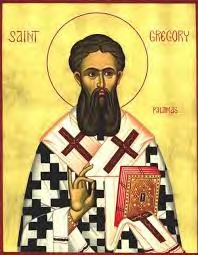 Gregory insists that there must be true theological boundaries when we think about God and these must include inherent limitations of human thought and speech about God. Any real discussion of the Trinity must begin with the humble acknowledgement of true human reason’s inability to conceive and describe God’s nature adequately: “It is difficult to conceive God, but to define him in words is an impossibility” he says. In his opinion, it is impossible to express Who God is and even more impossible to conceive Him. All we can really say is Who God IS not, indicating that He is without limitations or any sort of inabilities. St. Gregory writes:
Gregory insists that there must be true theological boundaries when we think about God and these must include inherent limitations of human thought and speech about God. Any real discussion of the Trinity must begin with the humble acknowledgement of true human reason’s inability to conceive and describe God’s nature adequately: “It is difficult to conceive God, but to define him in words is an impossibility” he says. In his opinion, it is impossible to express Who God is and even more impossible to conceive Him. All we can really say is Who God IS not, indicating that He is without limitations or any sort of inabilities. St. Gregory writes:
For that which may be conceived may perhaps be made clear by language, if not fairly well, at any rate imperfectly, to anyone who is not quite deprived of his hearing, or lazy in understanding. But to comprehend the whole of so great a subject as this is quite impossible and impracticable, not merely to the utterly careless and ignorant, but even to those who are highly exalted, and who love God.
These limitations apply to “every created nature; seeing that the darkness of this world and the thick covering of the flesh is an obstacle to the full understanding.” Gregory is not denying the existence of God, but he insists that the knowledge of God’s essence, the nature of God, is sharply limited because God’s nature is by definition “incomprehensible and illimitable.”
If so, what can be said? Are we left entirely in a wordless vacuum? No. Gregory insists. Both “our very eyes and the law of nature” clearly communicate to us the reality of God’s existence and “that he is the efficient and maintaining cause of all things.” As we gaze upon “visible objects,” we see their “beautiful stability and progress, immovably moving and revolving if I may so say.” Natural law in term manifests itself.
The difficulty that knowledge of God poses, Gregory states, is that the “approximations” of reason will always fall short of the glory of the subject it is trying to encompass, understand and explain. Yet there are certain things we can know about God, even if our knowledge is largely a series of negations. For example, Gregory comments, we can know that God does not have a body. If God did, how could God possible be “infinite and limitless, formless, intangible and invisible”.
Think about this!
